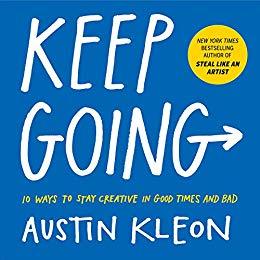More on this book
Community
Kindle Notes & Highlights
by
Austin Kleon
Read between
April 17 - April 22, 2022
The reason is this: The creative life is not linear. It’s not a straight line from point A to point B. It’s more like a loop, or a spiral, in which you keep coming back to a new starting point after every project. No matter how successful you get, no matter what level of achievement you reach, you will never really “arrive.” Other than death, there is no finish line or retirement for the creative person.
The truly prolific artists I know always have that question answered, because they have figured out a daily practice—a repeatable way of working that insulates them from success, failure, and the chaos of the outside world.
We have so little control over our lives. The only thing we can really control is what we spend our days on. What we work on and how hard we work on it. It might seem like a stretch, but I really think the best thing you can do if you want to make art is to pretend you’re starring in your own remake of Groundhog Day: Yesterday’s over, tomorrow may never come, there’s just today and what you can do with it.
“Relying on craft and routine is a lot less sexy than being an artistic genius. But it is an excellent strategy for not going insane.” —Christoph Niemann
When you don’t have much time, a routine helps you make the little time you have count. When you have all the time in the world, a routine helps you make sure you don’t waste it. I’ve written while holding down a day job, written full-time from home, and written while caring for small children. The secret to writing under all those conditions was having a schedule and sticking to it.
To establish your own routine, you have to spend some time observing your days and your moods. Where are the free spaces in your schedule? What could you cut out of your day to make time? Are you an early riser or a night owl?
“The simple thing I’ve learned over the years is just to have a starting point and once you have a starting point the work seems to make itself,”
Every day is like a blank page: When you’re finished filling it, you can save it, you can crumple it up, or you can slide it into the recycling bin and let it be. Only time will tell you what it was worth.
Even if it’s for fifteen minutes, give yourself some time in the morning to not be completely horrified by the news.
It’s not sticking your head in the sand. It’s retaining some of your inner balance and sanity so you can be strong and do your work. You can be woke without waking up to the news.
“The phone gives us a lot but it takes away three key elements of discovery: loneliness, uncertainty, and boredom. Those have always been where creative ideas come from.” —Lynda Barry
Airplane mode is not just a setting on your phone: It can be a whole way of life.
“I must decline, for secret reasons.” —E. B. White
JOMO: the Joy Of Missing Out.
Musicians can jam without making a recording. Writers and artists can type or draw out a page and throw it away. Photographers can take photos and immediately delete them.
Nothing makes play more fun than some new toys. Seek out unfamiliar tools and materials. Find something new to fiddle with. Another trick: When nothing’s fun anymore, try to make the worst thing you can. The ugliest drawing. The crummiest poem. The most obnoxious song. Making intentionally bad art is a ton of fun.
“Not everything that can be counted counts, and not everything that counts can be counted.” —William Bruce Cameron
“No artist can work simply for results; he must also like the work of getting them.” —Robert Farrar Capon
“Don’t make stuff because you want to make money—it will never make you enough money. And don’t make stuff because you want to get famous—because you will never feel famous enough. Make gifts for people—and work hard on making those gifts in the hope that those people will notice and like the gifts.” —John Green
You know what success is, or at least you have your own definition of it. (Mine: when my days look how I want them to look.) “Suckcess,” on the other hand, is success on somebody else’s terms. Or undeserved success. Or when something you think sucks becomes successful. Or when success or chasing after it just plain starts to suck.
A. A. Milne made up Winnie-the-Pooh for his son, Christopher Robin Milne. Astrid Lindgren’s bedridden daughter Karin asked her to tell a story about some girl named Pippi Longstocking. C. S. Lewis convinced J. R. R. Tolkien to turn the fantastical stories he told his children into The Hobbit. The list goes on and on.
“For anyone trying to discern what to do with their life: PAY ATTENTION TO WHAT YOU PAY ATTENTION TO. That’s pretty much all the info you need.” —Amy Krouse Rosenthal
When you have a system for going back through your work, you can better see the bigger picture of what you’ve been up to, and what you should do next.
The world doesn’t necessarily need more great artists. It needs more decent human beings. Art is for life, not the other way around.
“If you’ve never changed your mind about something, pinch yourself; you may be dead.”
Walking really is a magic cure for people who want to think straight. “Solvitur ambulando,” said Diogenes the Cynic two millennia ago. “It is solved by walking.”
“Go out and walk. That is the glory of life.” —Maira Kalman


